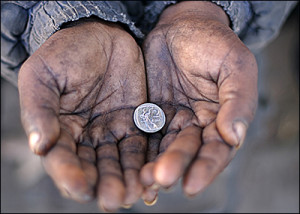Corruption Devastates the Poor
By Stephen Shepherd, Marketing –
When I worked in Brazil, I lived for a time in a small Amazonian city called Coari. One day, a Brazilian friend of mine and I were walking near the edges of a poverty-stricken neighborhood when we approached an abandoned region full of half-constructed buildings. It was like entering a ghost town that had never actually been inhabited. We saw a few kids playing soccer on the muddy grounds of an unfinished school and continued on our way past dozens of identical, roofless homes.
The Tale of an Unfinished City
I asked my friend what had happened. He explained that the whole neighborhood was a government-funded project designed to lift dozens of families out of poverty by providing them with homes and improved access to education. The development was well underway before the funding mysteriously disappeared, stopping the project in its tracks.
While a number of homeless locals moved into the unfinished brick homes after creating makeshift roofs and doors, a greater number of families remained in poverty. The buildings stand as a reminder that a few corrupt men deprived a whole community of a better future. And they got away with it.
Corruption Enables Elite, Crushes the Poor
British Prime Minister David Cameron said, “Why does aid not get through to the people who need it the most? The answer: corruption. Why do so many countries with massive mineral wealth have rich elites and large numbers in grinding poverty? Corruption.”
The U.N., Transparency International, and various other organizations are working to reach global development goals to end extreme poverty, some of which include increasing access to education and adequate healthcare. Transparent government and better job opportunities also rank high on the list of priorities.
Naming the Terms
Helen Clark, an administrator of the U.N. Development Programme (UNDP), said weak governance and abuse of power create a nearly unbreakable barrier to a nation’s development. She also named “transparent, responsive and accountable institutions” as a major factor necessary for improving people’s quality of life.
Of all the U.N.’s development goals, rooting out corruption is one of the most controversial and demanding priorities. Obviously, corrupt governments are usually unwilling to comply. What can we do to protect our corporate and political leaders from falling into the trap of corruption?


